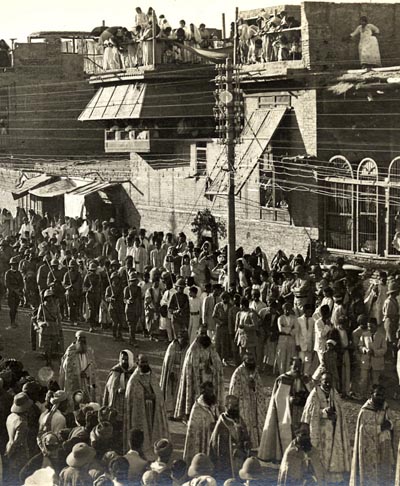our humanly race

In a short time a city can swing from open to closed, from something fluid & made of multiples to occupied, divided, entrenched. What awaits us?jace at Mudd Up has a very good short post (with mp3) about the real and mythopoetic Baghdad, and its music, which pointed me to this great NS article, "A Lost World":
Yeheskel Kojaman's Baghdad is a city of dust roads, alley markets, minarets and palm trees. Muslim, Jewish, Armenian and a few European coffee drinkers lounge in cafes where you can pay - in Indian rupees - to pick and eat fresh salad or have a fish pulled from the Tigris and grilled in front of you. The streets, nightclubs and houses are full of music. "The singer Hdhairy Abou Aziz has a radio programme every Friday from 12 noon till one," says Kojaman. "For this hour, all movement in Iraq stops. Everybody is in the coffee shop or the house, listening to Abou Aziz."Honest Jon's - probably the best compilation album guy in the world - have just released Songs Of The Brokenhearted - Baghdad, 1925-1929.
Excavated Shellac has more here (with mp3). The same site has a nice piece about Moe Asch of Folkways, soundtracked by a Central Asian song about Stalin: an Azeri folk song. I don't know if he was talking about this track in particular, but Woody Guthrie said:
Sticking with Central Asia, Unfashionably Late is in Armenia, and posts this thought-provoking piece on musical tourism, inspired by the ghettotech bangers s/he's found in Yerevan.I can’t understand one single word of this Central Eastern lingo, but by hearing these songs I know more about our humanly race than I could learn by reading a thousand Congressional Reports.
The consistently excellent Ceci N'Est Pas Un Blog has a great post about three songs about injustice and migration: Randy Newman's awesome "Sail Away"(including a version by the late Kirsty MacColl of Croyden), Woody Guthrie's "Deportees" and Ry Cooder's "Across the Borderline". Listen to the words. See also "How to Write A Political Song" at Star Maker Machine.)
 Staying with America, but in a more humorous mode, Boogie Woogie Flu has a post, "Not Kosher", filled with songs about pig meat, including Red Foley's hillbilly jive and Blind Boy Fuller's country blues. Between Woody's "Deportees" and Bessie Smith singing "Gimme a pigfoot and a bottle of beer" you have the cruelty and the grandeur that is America.
Staying with America, but in a more humorous mode, Boogie Woogie Flu has a post, "Not Kosher", filled with songs about pig meat, including Red Foley's hillbilly jive and Blind Boy Fuller's country blues. Between Woody's "Deportees" and Bessie Smith singing "Gimme a pigfoot and a bottle of beer" you have the cruelty and the grandeur that is America.(The image here, by the way, is not from America, but Brixton market, Sarf London, the place I most identify with pig's feet. It's from Ben Sicluna on flickr.)
I mentioned Woody in my "Cocaine Blues" article. Related to "Cocaine Blues" is "Willie the Weeper", which features in this fantastic post by snuh, "Steal This Post", on Picasso's dictum that "Good artists copy. Great artists steal." "Willie the Weeper" also relates to the Louis Armstrong drug song "Kicking the Gong Around" in this post, which I linked to back here.
Having got us back to trad jazz, I can mention Mezz Mezzrow, the Jewish hepcat who, when he was in prison, asked to be put on the coloured wing, that's who hep he was. We've talked about him before, but you can hear one of his songs at this wonderful Moistworks post (which I had originally planned to use to introduce the topic of my innumeracy, which would have segued into a response to this post, but that'll have to wait...).
Isn't the internet wonderful? When my friend Daniel introduced me to Mezz, many years ago, I had no way of knowing what he sounded like - as when I read about Slim Gaillard in David Toop's Rap Attack - without enormous effort. Now, a few clicks. But there's something lost too, isn't there, when it's that easy.
Previous: A stress on the ish, Found music.


Comments
Your support in this matter would be appreciated.
When states are nationalised and nations get states, there is always a minority produced. Once that minority is thus identified, they are then made move-able, or, worse, eliminable. (I know those aren't all words.)
(Hence the massive trasfers of "Greek" people out of Asia Minor (including many people who didn't even speak Greek but were just nominally Christian). Rembetika music carries the memory of that act of ethnic cleansing. Hence the Armenian massacre, the violence of the Partition of India and on-going pogroms against Muslims in Gujerat. And on and grimly on.)
Empires, of course, have generally been horrible institutions, and they found ways of using diversity to manage populations - as with the Ottoman millet system, and all the "middle man" ethnicities that Britain shipped around the world (e.g. Asians in East Africa and parts of Caribbean). But by doing this they allowed all sorts of cultures to flourish that subsequent nation-states have tried to kill off.
Sorry to go on at such length, but this relates to the comments on the Flesh is Grass post below this one, so it's on my mind.